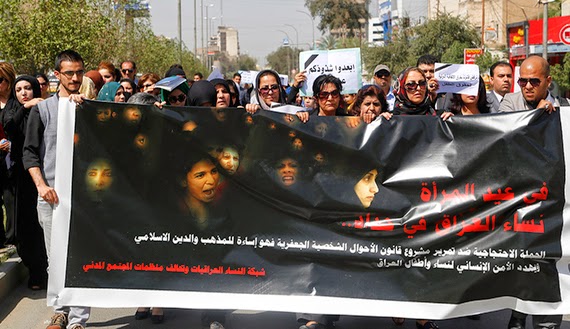Conservative political parties of different affiliations have been controlling the political and security landscape in Iraq over the past years. However, all of them have attempted to restrict women’s freedoms and rights. These attempts are still continuing, despite the popular resistance that succeeded in curbing a series of decisions and actions that seemed to belong to the Middle Ages.
There have been undeclared decisions to impose the veil on female employees in some government departments. This is not to mention the decisions of some local governments in the provinces of Wasit and Muthanna, for instance, to force women who are members of the local authorities to be accompanied by their husbands, fathers or brothers during their work and when they leave their houses.
Of course, things do not end with the Jaafari personal status law, which sparked a series of angry reactions from Iraqi civil activists, who considered the law to be an insult to Iraqi women.
In light of all these undeclared measures and some explicit decisions to create pressure on women, the pertinent question is: Are Iraqi officials aware that such decisions and measures constitute a violation of the Iraqi constitution, and set the stage for Iraq to become culturally, socially and politically alienated from the world?
Regarding constitutional requirements, the Iraqi constitution is rich with texts that uphold personal freedoms, preventing any act of suppression against women. For instance, Article 14 of the constitution stipulates that "Iraqis are equal before the law without discrimination based on gender, race, ethnicity, nationality, origin, color, religion, sect, belief or opinion or economic or social status."
Article 15 provides for the rights of every individual "to enjoy life, security and liberty," and, "Deprivation or restriction of these rights is prohibited except in accordance with the law."
Article 17 stipulates, "Every individual shall have the right to personal privacy so long as it does not contradict with the rights of others and public morals."
Therefore, the concept of non-discrimination based on gender ought to be clear in the minds of Iraqi legislators and decision-makers alike. Thus, the constitutional text against discrimination entails the need to revise any law issued by the state that includes explicit discrimination against women.
The undeclared measures and decisions against women are clearly categorized under the category of "gender discrimination."
Regarding Iraq’s ties to the world and keeping abreast with the international agreements on human rights, it should be noted that Iraq is among the signatories of the Universal Declaration of Human Rights, as well as other international conventions to guarantee human rights and prevent discrimination.
Iraq’s obligations are not just for show. Thus, any violations in this regard entail legal implications, and would affect Iraq’s relations with other countries in the world.
Throughout its modern history, Iraq has never had laws discriminating against women.
Indeed, the Personal Status Law of 1959, which some seek to change today, grants women the right to separate from their husbands through civil courts. Meanwhile, women in most other countries of the Middle East continue to be denied this right.
Moreover, the Iraqi constitution is a civil constitution par excellence, despite the interpretation of some of its texts, which have been violated on several occasions.
Conservative political groups ought to cope with the fact that Iraq is a civil state, where public freedoms and basic rights of humans are safeguarded.
Discrimination, whatever its basis, is not accepted. These groups do not have the right to ask people to conform to a certain lifestyle and behavior they deem right or fit. The ability of these political parties to adapt to the constitutional reality of Iraq is what will determine the future of the country.
by Mustafa al-Kadhimi















0 Comments